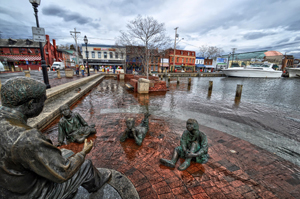Energy Efficiency + Climate Change: A Conversation with the National Trust for Historic Preservation
15 March 2014 – Priya Chhaya

Annapolis, Maryland, designated a National Treasure by the National Trust for Historic Preservation, is regularly flooded by high tides in the Chesapeake Bay. Photo credit: Amy E. McGovern
Public historians are communicators. We tweet, blog, analyze, interpret, and document events for a variety of different publics. We make connections, linking widespread evidence into a single narrative.
It is that skill set that we are looking for at “Energy Efficiency + Climate Change: A Conversation with the National Trust for Historic Preservation” on Thursday from 8:30-10 a.m. at the 2014 National Council on Public History Conference. While the session will provide an overview of the National Trust’s work in Sustainability (through the Trust’s National Treasures and the Preservation Green Lab) the bulk of our time will be devoted to working with the audience on a brainstorming exercise.
It has become clear in recent years that doubters of climate change will not be swayed on the science alone. It’s up to historians and those who work with the fabric of history to help make the case, especially regarding our historic resources. Some of this comes from data collection, like measuring the benefits of maintaining older buildings in neighborhoods and cities in terms of walkability and the conservation of their “embodied energy.” In other ways this can be measured through documenting what rising sea levels will do to our coastal historic sites and communities.
The problem for those of us not directly involved in the more scientific areas of the sustainability and climate change conversation is making our voices heard. How do we communicate the role of historians and preservationists in this conversation? How do we convince our audiences that “thinking green” is an important strategy in protecting places and stories of the past?
How might we make a real and measurable impact in communicating the role historic places can play in building sustainable communities?
We’re looking to you to help kick off a robust conversation where we can all put our minds together to develop strategies and opportunities to engage in this conversation.
Hope to see you there!
Session Information:
Is it possible to make historic resources resilient to climate change? Is the protection of historic resources compatible with working toward environmental sustainability? Join the National Trust for Historic Preservation for a conversation about the unique challenges of balancing preservation and public history with addressing sustainability and climate change. This discussion will offer diverse perspectives and real examples of what the Trust is doing regarding this topic. The session will include three short presentations followed by an opportunity for collaboration and group brainstorming.
Facilitator: Priya Chhaya, National Trust for Historic Preservation
Participants:
- Jim Lindberg, National Trust for Historic Preservation, Preservation Green Lab
- Anthony Veerkamp, National Trust for Historic Preservation
- Jeana Wiser, National Trust for Historic Preservation, Preservation Green Lab




1 comment